Advertisements
Advertisements
A conducting rod is moved with a constant velocity v in a magnetic field. A potential difference appears across the two ends _____________ .
Concept: undefined > undefined
L, C and R represent the physical quantities inductance, capacitance and resistance respectively. Which of the following combinations have dimensions of frequency?
(a) `1/(RC)`
(b) `R/L`
(c) `1/sqrt(LC)`
(d) C/L
Concept: undefined > undefined
Advertisements
The switches in figure (a) and (b) are closed at t = 0 and reopened after a long time at t = t0.
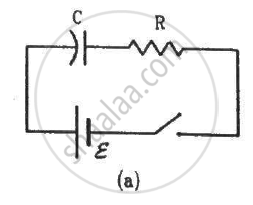
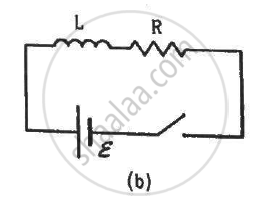
(a) The charge on C just after t = 0 is εC.
(b) The charge on C long after t = 0 is εC.
(c) The current in L just before t = t0 is ε/R.
(d) The current in L long after t = t0 is ε/R.
Concept: undefined > undefined
Calculate the dimensions of (a) \[\int \overrightarrow{E} . d \overrightarrow{l,}\] (b) vBl and (c) \[\frac{d \Phi_B}{dt}.\] The symbols have their usual meaning.
Concept: undefined > undefined
A conducting square loop having edges of length 2.0 cm is rotated through 180° about a diagonal in 0.20 s. A magnetic field B exists in the region which is perpendicular to the loop in its initial position. If the average induced emf during the rotation is 20 mV, find the magnitude of the magnetic field.
Concept: undefined > undefined
Figure shows a wire sliding on two parallel, conducting rails placed at a separation l. A magnetic field B exists in a direction perpendicular to the plane of the rails. What force is necessary to keep the wire moving at a constant velocity v?
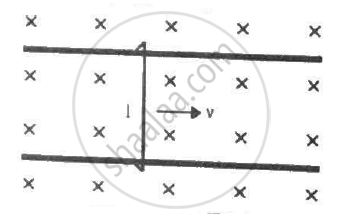
Concept: undefined > undefined
Figure shows a long U-shaped wire of width l placed in a perpendicular magnetic field B. A wire of length l is slid on the U-shaped wire with a constant velocity v towards right. The resistance of all the wires is r per unit length. At t = 0, the sliding wire is close to the left edge of the U-shaped wire. (a) Calculate the force needed to keep the sliding wire moving with a constant velocity v. (b) If the force needed just after t = 0 is F0, find the time at which the force needed will be F0/2.0
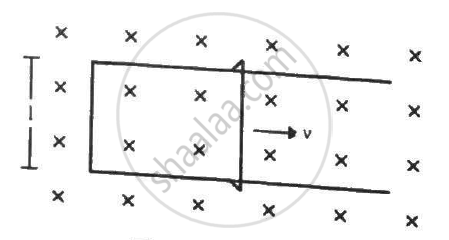
Concept: undefined > undefined
How many wavelengths are emitted by atomic hydrogen in visible range (380 nm − 780 nm)? In the range 50 nm to 100 nm?
Concept: undefined > undefined
Each of the batteries shown in figure has an emf equal to 5 V. Show that the magnetic field B at the point P is zero for any set of values of the resistances.
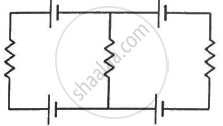
Concept: undefined > undefined
We have stimulated emission and spontaneous emission. Do we also have stimulated absorption and spontaneous absorption?
Concept: undefined > undefined
An atom is in its excited state. Does the probability of its coming to ground state depend on whether the radiation is already present or not? If yes, does it also depend on the wavelength of the radiation present?
Concept: undefined > undefined
Three photons coming from excited atomic-hydrogen sample are picked up. Their energies are 12.1 eV, 10.2 eV and 1.9 eV. These photons must come from
Concept: undefined > undefined
The energy of an atom (or ion) in its ground state is −54.4 eV. It may be
Concept: undefined > undefined
A hot gas emits radiation of wavelengths 46.0 nm, 82.8 nm and 103.5 nm only. Assume that the atoms have only two excited states and the difference between consecutive energy levels decreases as energy is increased. Taking the energy of the highest energy state to be zero, find the energies of the ground state and the first excited state.
Concept: undefined > undefined
If neutrons exert only attractive force, why don't we have a nucleus containing neutrons alone?
Concept: undefined > undefined
Potassium-40 can decay in three modes. It can decay by β−-emission, B*-emission of electron capture. (a) Write the equations showing the end products. (b) Find the Q-values in each of the three cases. Atomic masses of `""_18^40Ar` , `""_19^40K` and `""_20^40Ca` are 39.9624 u, 39.9640 u and 39.9626 u respectively.
(Use Mass of proton mp = 1.007276 u, Mass of `""_1^1"H"` atom = 1.007825 u, Mass of neutron mn = 1.008665 u, Mass of electron = 0.0005486 u ≈ 511 keV/c2,1 u = 931 MeV/c2.)
Concept: undefined > undefined
Why is conducting easier in gases if the pressure is low? Will the conduction continue to improve if the pressure is made as low as nearly zero?
Concept: undefined > undefined
Cathode rays constitute a stream of _______________ .
Concept: undefined > undefined
Cathode rays are passing through a discharge tube. In the tube, there is ______________ .
Concept: undefined > undefined
